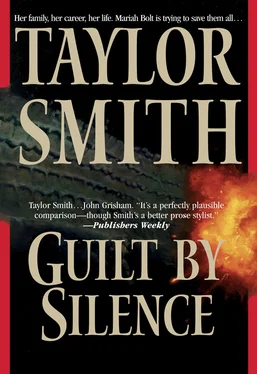1 ...8 9 10 12 13 14 ...18 Perching herself on the edge of his desk, Mariah examined the dusty framed photos of his kids and grandson while she waited. She picked up the picture of Carol, Frank’s daughter, standing in a wedding dress beside her husband, Michael. They had been married four years earlier, just a few weeks before Mariah and David had left for Vienna. Examining the picture, Mariah smiled as she remembered Frank’s uncharacteristic beam when he had walked his daughter down the aisle. His only regret, he’d said, was that his wife hadn’t been there to see their daughter happily married.
Next to the wedding picture was a shot of baby Alex, Carol’s son— “the ankle biter,” Frank called him, his pride obvious behind his good-natured grumbling. He had been born eight months earlier, but the only photo Frank seemed to have was the infant’s hospital picture, little Alex’s face red and squashed like that of every newborn babe since the beginning of time—Lindsay included, Mariah thought, touching the photo with a soft smile. She returned the baby’s picture to its place on Frank’s desk and picked up the remaining frame.
And then there was Stephen, Carol’s twin. The high school graduation photo was at least ten years old. Joanne Tucker’s leukemia had been diagnosed when the twins were two, and they were fifteen when Frank’s wife finally lost her battle with the disease. Carol had become the family’s mother substitute during the long crisis, but Stephen had reacted with anger and defiance, most of it directed against Frank. It hadn’t been an easy time for either of them. Maybe it would have happened, anyway, Mariah thought, a normal conflict between a strong-willed father and an equally stubborn son. In the end, after a period of sullen rebellion and minor scrapes with school authorities, Stephen had finally managed to pull his act together. Now, at twenty-eight, he was a computer specialist deep in the bowels of the CIA. But despite the fact that he had followed his father into the Company, the two were still as different—and incompatible—as night and day.
Frank hung up the phone and turned to Mariah. “Okay, what have you got for me?”
“The latest take on that new arms link,” she said, slipping off the edge of the desk and into a chair across from him. “You know, I still don’t know why we’re doing this, Frank.”
“Doing what?”
“Chasing crazy Irishmen and Libyans and Iranians and God knows who else. How did we get into the terrorist game? You and I are supposed to be Soviet experts.”
“Times have changed. The Soviet Union is kaput.”
“Yes, but their nukes aren’t. Why didn’t they make you head of the new nonproliferation unit? You were the logical choice—and that’s where I wanted to be, too.”
“Call it career development. Guess they decided we should widen our focus a bit. Anyway,” he said, more briskly, “let’s get on with this report. That was the seventh floor on the phone just now. The director wants to read it over the weekend, so we’re going to have to hustle and get this baby delivered.”
“It’s under control.”
Frank nodded. He was the one who had recruited her into the Agency and had been something of a mentor for much of the past sixteen years. Mariah knew he had total confidence in her.
Tucker had approached her on the recommendation of one of her professors when she was doing her graduate degree at Berkeley. She had met with him one afternoon in an off-campus office—a huge man, completely bald except for bushy black eyebrows that seemed to be compensating for the deficit of hair on the rest of his head. Years later—over a late-night glass of Frank’s secret stock of Glenlivet that they had broken out to celebrate the closing of a difficult file—Mariah had given in and asked him whether he shaved his head for the pristine bowling-ball effect. He did.
She could have a bright future with the CIA, Frank had said. They were looking for people like her with a strong understanding of the Soviet Union and its military capabilities. She had been astonished, then a little appalled, when she realized that this intimidating man from CIA headquarters at Langley was serious about offering her a job. It was the mid-seventies. The Vietnam War had just ended and “peace, love and good vibes” was still the operative theme on American campuses. The CIA, to put it mildly, was not in good odor—especially at Berkeley.
All the same, Mariah had spent several years studying the Soviet threat and she had no illusions about Moscow’s ambitions, either. It was just naïve, she was convinced, to think you could face down that kind of threat without decent intelligence work. She had never seen herself in the spook business, but Tucker’s offer had been intriguing, his arguments persuasive as he talked about the importance of solid intelligence analysis to avoid the snake pits out there.
But Mariah and David had become seriously involved by then and he had already been offered the job at the Los Alamos National Laboratory, so she turned Tucker down and followed David to New Mexico. But then, six months later, she left New Mexico and said yes to a career as a CIA analyst, after all—even if it also meant the end of her relationship with David. That didn’t seem to be going anywhere, anyway.
Mariah had gone through the basic Company training program and had then been sent to work as an analyst in the Soviet section headed by Frank Tucker, undaunted by his reputation as a chief who ate analysts for breakfast. To be sure, working with Tucker was challenging. The fierce glare of the beetle dark eyes under those black eyebrows had terrified a legion of analysts.
And no secretary had stayed with Tucker for more than a few weeks until Personnel had finally had the wit to park Patricia Bonelli outside his door, a New Jersey native with a truck driver’s vocabulary who could give as good as she got when Frank Tucker got too far out of line. Someone had once told Mariah that Patty and Frank had a legendary, rip-roaring battle the first day she came on stream. But when Frank realized that Personnel had sent him the female equivalent of Genghis Khan as a secretary, he broke down and roared with laughter—much to the amazement of the trembling staff in the section, who had expected a bloodbath.
His secretary had been with him for almost twenty years now. When Mariah had appeared on the scene, Patty had recognized a kindred spirit and had explained the fundamentals of dealing with Frank Tucker. They boiled down to this, she said: never cringe, never apologize, and never—but never—screw up. Easier said than done, maybe, but it suited Mariah to a T. She had worked with Tucker, off and on, for most of her career since.
“Are you okay, Mariah? You look dead on your feet.”
She glanced up sharply. Frank Tucker could never be accused of being the most sensitive man in the world. If he thought she was looking tired, she must look god-awful.
“I’m fine. I didn’t sleep very well last night.” She hesitated, debating whether or not to raise the subject of Chaney. But they had been over this ground many times during the investigation of the accident. Mariah knew what Frank’s reaction to Chaney’s claims would be and she knew who she trusted. It wasn’t Paul Chaney. Leave it, she decided—don’t keep picking at this scab. Let it heal. “Where were we?”
“You were telling me about the Libyan connection.”
“Right. Tripoli station has an asset who says Libya may be shipping arms through the island of Madeira.”
“Have the birds picked up anything?”
Mariah nodded. “I was down with the satellite recon boys yesterday. There was a shipment out of Tripoli three weeks ago on a state-owned Libyan vessel. The birds picked up markings on the crates that said they contained tomatoes, but the Libyans don’t usually export vegetables to Madeira. And there was an awful lot of security watching over those so-called tomatoes.”
Читать дальше












